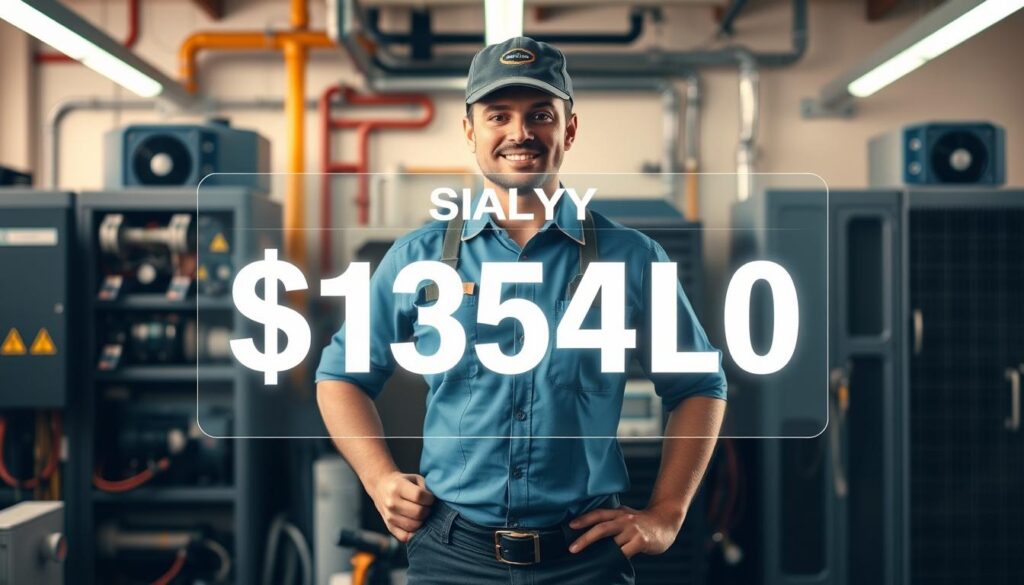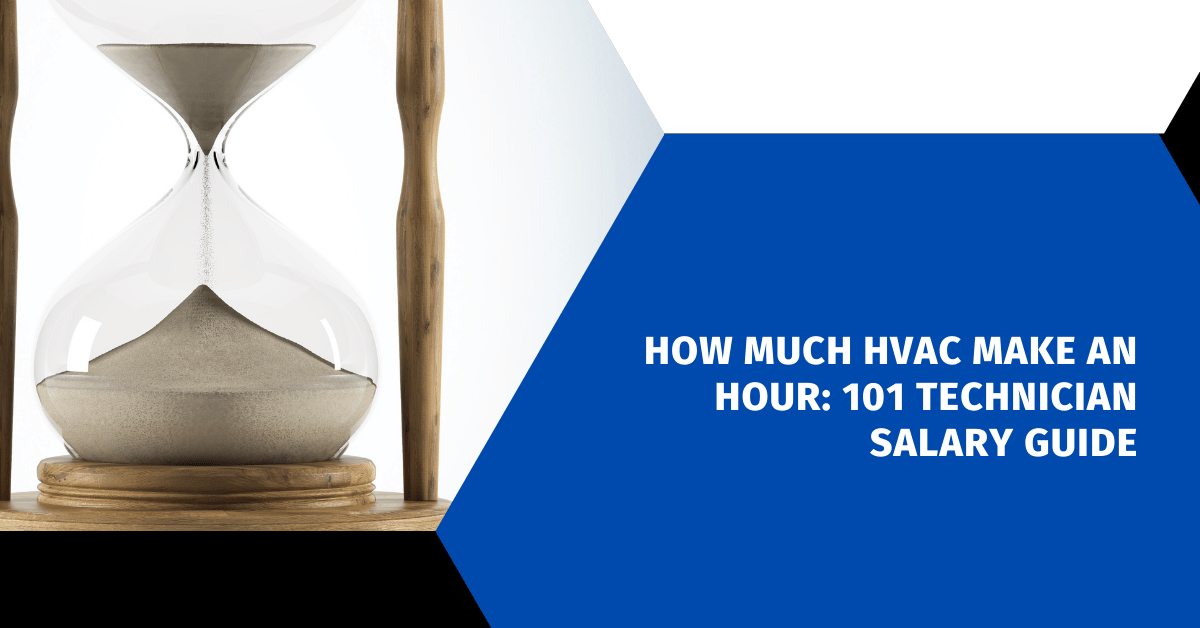Affiliate Disclosure
HVAC Guide Guys is a participant in the Amazon Services LLC Associates Program, an affiliate advertising program designed to provide a means for sites to earn advertising fees by advertising and linking to Amazon.
How Much HVAC Make An Hour? Ever wondered how much HVAC technicians make an hour? It’s a key question for those interested in this field. Knowing the answer can open doors to great careers and financial success.

The salary for HVAC technicians is both promising and varied. Payscale.com reports that newbies can earn about $26.01 an hour. As they gain experience and skills, their earnings can grow even more.
Choosing a career in HVAC is more than just a job. It’s a smart move that can lead to financial rewards. This guide will dive into the details of HVAC technician pay. It aims to help you understand the financial side of this important trade.
Key Takeaways
- Entry-level HVAC technicians earn approximately $26.01 per hour
- Salary increases with experience and specialized certifications
- Where you work greatly affects your earnings
- There are chances to move up in both home and business settings
- Staying in school can help you earn more
Table of Contents
Understanding HVAC Technician Salary Fundamentals
Exploring careers in the HVAC industry means understanding how you get paid. HVAC jobs offer good pay for skilled workers. The pay varies based on several factors.
Getting paid in HVAC isn’t just about an hourly rate. Your total pay depends on many important things. These factors shape how much you can earn in the HVAC field.
Base Pay vs Total Compensation
Your base salary is just one part of your earnings. A good compensation package includes:
- Hourly wage or annual salary
- Performance bonuses
- Health insurance benefits
- Retirement contribution plans
- Overtime pay opportunities
Factors Affecting HVAC Wages
Many things can change how much you earn in HVAC:
- Experience level – More experience means higher pay
- Specialized certifications
- Where you live
- Job type (residential vs commercial)
- Your skills and specializations
Industry Demand Impact on Salaries
The Bureau of Labor Statistics says the HVAC field will grow a lot. It expects 40,100 new jobs by 2033. This growth means better pay and chances to move up in your career.
Skilled HVAC technicians who keep learning and stay up-to-date with technology will earn more.
Explore Our HVAC Shop
Looking for top-rated HVAC tools, parts, and accessories? Visit our shop and find the perfect solution for your needs.
Visit the ShopHow Much HVAC Make An Hour Across Experience Levels
Your earnings as an HVAC technician change a lot with experience. Knowing how much you can make an hour helps plan your career. It also sets realistic income goals.
Starting out, HVAC technicians earn less but can grow quickly. Skill development and hands-on experience are key to earning more. They help increase your income.
- Entry-Level (0-2 years): $22-$28 per hour
- Mid-Level (2-4 years): $28-$35 per hour
- Senior-Level (4-7 years): $35-$45 per hour
Getting better at your job is important for your salary. As you learn more and get better skills, you’ll earn more per hour.
“Experience transforms into higher earning power in the HVAC industry.” – Professional HVAC Association
Many things affect how much you earn. These include your technical skills, certifications, and how well you do your job. Also, specializing in certain areas of HVAC repair and maintenance can help.
Geographic Salary Variations in HVAC Industry
Your salary as an HVAC worker can change a lot based on where you work. The location you’re in greatly affects how much you earn. This is true across different states and areas.
HVAC salaries vary across the United States. Some places pay more because of the local economy, demand, and living costs.
Highest Paying States for HVAC Professionals
Some states pay HVAC technicians more than others. The top states for salaries are:
- California: Offers highest median salaries around $59,200
- New Jersey: Competitive wages reaching $58,300
- Washington: Strong market with salaries near $58,000
Metropolitan vs Rural Area Wages
Urban areas usually offer better pay for HVAC workers. Cities provide:
- Higher base salaries
- More frequent job opportunities
- Potential for specialized work
Cost of Living Adjustments
Think about the cost of living when looking at salaries. A high salary in a pricey city might not go as far as a lower salary in a cheaper area.
| Region | Average Salary | Cost of Living Index |
|---|---|---|
| San Francisco, CA | $65,000 | 269.3 |
| Dallas, TX | $55,000 | 101.8 |
| Chicago, IL | $58,500 | 106.9 |
Understanding regional differences can help you make the most of your HVAC career.
Explore Our HVAC Shop
Looking for top-rated HVAC tools, parts, and accessories? Visit our shop and find the perfect solution for your needs.
Visit the ShopExperience-Based Pay Structure
Your HVAC career path affects your pay. As you gain experience, your hourly rates go up. Beginners earn less, but experienced pros can make more by growing their careers.
Knowing how pay changes with experience helps you grow. HVAC pros move through stages:
- Entry-Level (0-2 years): Learning basic skills
- Intermediate (3-5 years): Getting specialized skills
- Advanced (6-10 years): Becoming a senior tech
- Expert (10+ years): Getting into supervisory roles
As you get better, so does your salary. HVAC supervisors with 7+ years make about $90,800 a year. That’s about $43.65 an hour.
“Continuous learning and skill enhancement are key to maximizing your earning in the HVAC industry.”
| Experience Level | Average Hourly Rate | Annual Salary Range |
|---|---|---|
| Entry-Level | $16 – $22 | $33,280 – $45,760 |
| Intermediate | $22 – $30 | $45,760 – $62,400 |
| Advanced | $30 – $40 | $62,400 – $83,200 |
| Expert/Supervisor | $40 – $45 | $83,200 – $93,600 |
To increase your pay, get more certifications, focus on complex systems, and keep your skills sharp. Your hard work and skills will lead to higher earnings.
Certification and Education Impact on Earnings
Getting certified and continuing your education can really boost your hvac technician salary. Professional credentials are key to increasing your earnings and moving up in your career in the HVAC field.
Understanding the certification world is important. It helps you know which credentials matter most for your hvac installer wages. Employers look for technicians who keep learning and show their skills with recognized certifications.
Essential Certifications for Career Growth
- EPA 608 Certification: Mandatory for handling refrigerants
- NATE (North American Technician Excellence) Certification
- HVAC Excellence Professional Level Certification
- OSHA Safety Certification
Advanced Certification Benefits
Going for advanced certifications can lead to big salary gains. These special certifications show you’re serious about learning the latest in HVAC systems and tech.
Potential benefits include:
- 5-15% salary increase with advanced certifications
- Enhanced job marketability
- Access to specialized high-paying roles
- Competitive edge in job applications
Continuing Education Value
Staying in school is a smart move for your hvac technician salary. Technical schools and professional groups offer workshops, online courses, and training. These keep your skills sharp and in demand.
Investing in education is investing in your future earning power.
By focusing on certifications and ongoing learning, you set yourself up for better-paying jobs in the HVAC industry.
Explore Our HVAC Shop
Looking for top-rated HVAC tools, parts, and accessories? Visit our shop and find the perfect solution for your needs.
Visit the ShopCommercial vs Residential HVAC Salaries

Looking into hvac service pay rates shows big differences between commercial and residential HVAC jobs. The unique skills needed for each area greatly affect hvac repair hourly pay and how much you can earn.
Commercial HVAC techs usually make more money because of the complex systems they work with. They handle advanced equipment in big places like office buildings, hospitals, and factories.
- Commercial HVAC systems are more complex and need advanced technical skills
- Residential work involves smaller installations and upkeep
- Getting specialized certifications can boost your earnings in both fields
The salary difference between commercial and residential HVAC jobs is big. Experienced commercial techs can earn 15-25% more than those in residential work. This is because commercial jobs need more technical know-how and are more complex.
“Specialization is key to maximizing your earning in the HVAC industry” – HVAC Industry Experts
Your career path greatly affects your income. Residential HVAC jobs offer steady work, but commercial techs have more chances for advanced training and better pay.
Think about getting specialized in commercial HVAC systems to boost your earnings and career. Getting advanced certifications and keeping up with new skills can help you earn more in both residential and commercial areas.
Career Progression and Salary Growth
Your HVAC career can grow from a skilled technician to a high-earning professional. Understanding how much you can earn helps you plan your career path.
In the HVAC industry, there are many ways to increase your earnings. Technicians can move up through different career stages:
- Entry-level technician
- Senior field technician
- Team supervisor
- Service manager
- Business owner
Entry to Senior Level Transitions
To move up, you need to keep learning and get certified. Most technicians take 3-5 years to become senior technicians.
Management Position Earnings
HVAC supervisors with lots of experience can earn more. They make between $70,000 and $95,000 a year. This depends on the company size and where you work.
| Position | Average Annual Salary | Experience Required |
|---|---|---|
| Entry-Level Technician | $45,000 | 0-2 years |
| Senior Technician | $62,000 | 3-5 years |
| Service Manager | $85,000 | 7-10 years |
Business Ownership
Starting your own HVAC business can really boost your earnings. Successful owners can make $150,000 to $250,000 a year. This depends on the demand and how well you run your business.
Choosing a career in HVAC can lead to big financial gains. Invest in your skills, certifications, and professional growth to succeed.
Explore Our HVAC Shop
Looking for top-rated HVAC tools, parts, and accessories? Visit our shop and find the perfect solution for your needs.
Visit the ShopBenefits and Additional Compensation

When we talk about hvac worker income, it’s not just about the hourly rate. HVAC pros get great benefits that boost their earnings. These benefits are key to understanding the full picture of hvac professional pay.
Typical benefits for HVAC technicians include:
- Health insurance coverage
- Retirement plans and 401(k) matching
- Paid vacation and sick leave
- Performance-based bonuses
- Tool and equipment allowances
Employers know how valuable skilled HVAC techs are. They offer top-notch compensation to keep them. Performance bonuses can range from 5% to 15% of base salary, giving a big boost to those who excel.
Specialized benefits can include:
- Continuing education reimbursement
- Professional certification support
- Vehicle and mileage compensation
- Life and disability insurance
Your earnings as an HVAC pro are more than just your hourly wage. By knowing and asking for these extra benefits, you can make more money. This makes for a rewarding career in HVAC.
Comparison with Other Trade Professions
When looking at hvac job hourly rates, it’s key to see how HVAC techs stack up against other skilled trades. Your career can go in many directions, and knowing salary comparisons can guide your choices.
Nationwide, HVAC techs hold their own in the skilled trades market. The numbers show how HVAC techs fare hourly compared to other trades.
Electrician Wage Comparison
Electricians usually make a bit more than HVAC techs. An entry-level electrician makes about $60,600 a year, while HVAC techs start at $54,100. The main differences are:
- Electrical work needs more specific training
- Electrical systems are more complex, requiring advanced skills
- There’s a chance for overtime and extra pay from commercial projects
Plumber Salary Benchmarks
Plumbers are another trade to consider. They start at about $53,900 a year, which is a bit less than HVAC techs.
Construction Trade Earnings
Construction trades have different pay levels. HVAC techs stay competitive, but your earnings can change based on your skills and where you work.
| Trade Profession | Entry-Level Annual Salary |
|---|---|
| HVAC Technician | $54,100 |
| Electrician | $60,600 |
| Plumber | $53,900 |
Your earnings in these trades depend on your skills, certifications, and ongoing learning. Each trade has its own path for growth and specialization.
Explore Our HVAC Shop
Looking for top-rated HVAC tools, parts, and accessories? Visit our shop and find the perfect solution for your needs.
Visit the ShopIndustry Growth and Future Earnings
The HVAC industry is on the verge of big growth, opening up new chances for technicians and installers. The Bureau of Labor Statistics says the sector will add 40,100 jobs by 2033. This shows a strong future for hvac technician salaries.
New trends are changing the HVAC job market. Green tech and smart home innovations are creating a big need for skilled workers. These changes offer many ways to grow your career and earn more.
- Energy-efficient system installations
- Smart home technology integration
- Sustainable HVAC solutions
- Advanced automation technologies
Your salary in HVAC will depend on your skills and how well you adapt to new tech. Those who keep learning and use the latest tech will see their salaries grow the most.
“The future of HVAC is not just about temperature control, but about creating intelligent, sustainable comfort solutions.”
What’s driving growth includes:
- Rising demand for energy-efficient systems
- More homes and buildings being built
- New tech in climate control
- More focus on being green
As the industry grows, your ability to learn and adapt will be key to earning more. Keep up with new skills, stay informed, and lead in tech innovation.
Conclusion
The HVAC industry is full of great opportunities for those looking for stable and well-paying jobs. Your success depends on improving your skills, learning more, and knowing the current pay rates. Technicians who get advanced certifications and focus on certain areas can earn more.
Where you work also affects how much you earn. Places with harsh weather or fast-growing cities often pay more. Being open to new things, learning about new tech, and staying up-to-date with skills will help you grow financially and keep your job secure.
As more people need skilled HVAC workers, your career path has many chances for growth. You can work in homes, businesses, or factories. Planning your career well, keeping learning, and striving for excellence will help you succeed in this important field.
Your time in the HVAC industry can be both rewarding and fulfilling. By knowing how much you can earn, improving your skills, and being flexible, you can create a successful career. This career will offer you stability, growth, and the joy of helping communities all over the United States.

